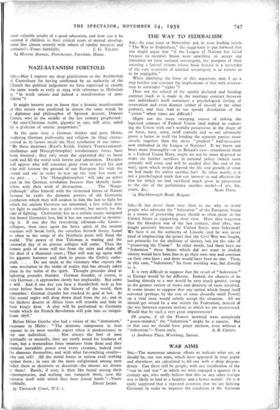THE WAY TO FEDERALISM Sta,—In your issue of November 3rd,
in your leading article " The Way to Federalism," the suggestion is put forward that one might argue that " if the League of Nations has failed because its member States were unwilling to accept any limitation on their national sovereignty, the prospect of their entering a federal system whose basic feature is a surrender of the very essentials of national sovereignty is so remote as to be negligible."
While admitting the force of this argument, may I go a step further and consider the implications of this very reserva- tion to surrender " rights "?
Does not the refusal of the openly declared and binding contract (such as is made in the marriage contract between two individuals) itself constitute a psychological feeling of reservation and even distrust (either of oneself or the other partner), and thus lead to too speedy dissolution of the " union " when times are difficult?
Might not the more sweeping course of risking the legalised contract of Federal Union (and indeed in endow- ing the Union with one's worldly possessions in the shape of air force, navy, army, tariff controls and so on) ultimately prove a factor in itself for binding the separate parties more closely together than the more " prudent " half-measures now embodied in the League of Nations? If we burnt our boats more thoroughly—or in Britain's case—transferred them to a Federal Union Navy, might we not be more disposed to make the further sacrifices in national policy (which most certainly will come and will be needed after The end of the war), upon which would depend the life and growth of what we had made the earlier sacrifice for? In other words, is it not a psychological truth that our interest in and affection for that for which we had sacrificed much grow in proportion to the size of the preliminary sacrifice made?—I am, Sir, Sia,—It has never been very clear to me why so many people who advocate the " federation " of the European States as a means of preserving peace should so often point to the United States as supporting their view. Have they forgotten that the bloodiest war of the last century, after 1815, was fought precisely because the United States were federated? We have it on the authority of Lincoln (and he was never tired of emphasising the point) that the Civil War was fought, not primarily for the abolition of slavery, but for the sake of " preserving the Union." In other words, had there been no " federation" those States which did not want to abolish slavery would have been free to go their own way and continue on their own lines ; and there would have been no war. Thus, in this case, " federation," far from avoiding war, led directly to it.
It is very difficult to suppose that the result of " federation " in Europe would be far different. Indeed, the chances of its leading directly to a war would be very much greater, owing to the greater variety of views and diversity of races involved. It seems insane to suppose that any nation which found itself outvoted (perhaps by the vote of some absurdly small Power) on a vital issue would calmly accept the situation. All we should get would be a war within the Federation, instead of the war between separate nations to which we are accustomed. Would that be such a very great improvement?
Of course, if all the Powers involved were completely " peace-minded," the " federation " might be a success. But in that case we should have peace anyhow, even without a " federation."—Yours truly, A. R. CRIPPS. .1.t Ambrose Place, Worthing, Sussex.




































 Previous page
Previous page